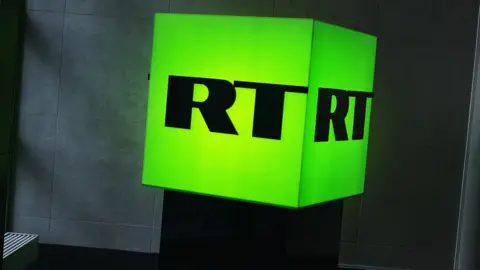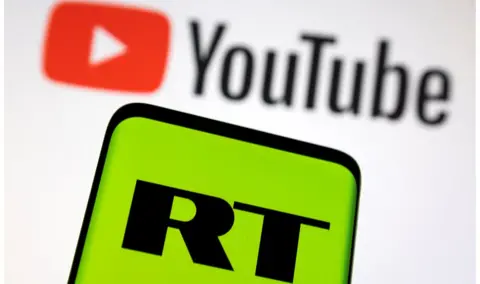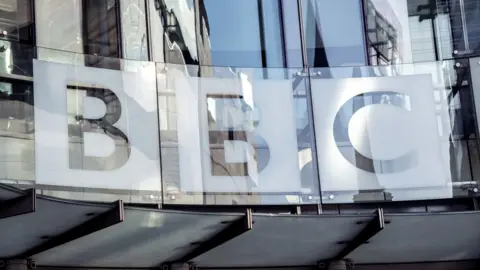RT: Russian-backed TV news channel disappears from UK screens
 Getty Images
Getty ImagesRussian-backed news channel RT has disappeared from all broadcast platforms in the UK.
UK access to the TV network, formerly called Russia Today, has been affected by a ban imposed by the European Union.
Although the UK is no longer in the EU, the bloc applied sanctions to satellite companies in Luxembourg and France, which provided the RT feed to Sky, Freesat and Freeview.
RT said "the facade of free press in Europe has finally crumbled".
UK Culture Secretary Nadine Dorries, who has described the channel as "Putin's polluting propaganda machine", said she hoped it would not return to UK screens.
"As part of a concerted effort and discussions, Russia Today is no longer streamed into British homes, either by TV, Sky, Freesat or Freeview," she told the House of Commons on Thursday.
"And we have contacted both [Facebook owner] Meta and TikTok to implore them to stop streaming Russia Today via their own online platforms.
"It is my absolute position that we will not stop until we have persuaded every organisation, based in the UK or not, that is the wrong thing to do to stream Russian propaganda into British homes."
UK media regulator Ofcom is currently investigating RT for 27 potential breaches of its broadcasting code. The watchdog has the power to revoke a broadcast licence, but any action is likely to take weeks.
Ms Dorries added: "I am hoping that they expedite those investigations and that those investigations result in the removal of Russia Today's licence so that they're never again able or have the platform to broadcast their propaganda into the UK."
She also said: "Of course, politicians have absolutely no influence over the free press and nor should they. That is the responsibility of the regulator Ofcom. And the very first thing I did was wrote to Ofcom to urge them to review the output of Russia Today."
The culture secretary became emotional as she offered her "heartfelt thanks and admiration" to journalists working for the BBC, ITV and other news outlets "who are risking their lives to bring us unbiased and accurate news from a live war zone".
 Reuters
ReutersThe EU said it was preventing RT and Sputnik, both state-owned broadcasters, from being received across Europe until the aggression towards Ukraine ends.
In a statement, the EU said RT and Sputnik promoted "systematic information manipulation and disinformation by the Kremlin".
In response to the channel's removal, RT deputy editor-in-chief Anna Belkina said: "Media regulation should be divorced from geopolitics, led by independent bodies and expert regulators, ensuring diversity in news and information sources is protected.
"Today, politicians in the EU have demonstrated their willingness to delegitimise independent regulators."
RT says it is an "autonomous" operation financed by the Russian Federation.
The removal of RT from the airwaves comes after YouTube blocked channels linked to RT and Sputnik across Europe.
"Due to the ongoing war in Ukraine, we're blocking YouTube channels connected to RT and Sputnik across Europe, effective immediately," a statement from Google Europe said earlier this week.
Facebook has also blocked access to RT and Sputnik in Europe.
Sir Nick Clegg, the former UK deputy prime minister, is now vice president of global affairs at Facebook's parent company, Meta. He tweeted on Monday: "We have received requests from a number of governments and the EU to take further steps in relation to Russian state-controlled media.
"Given the exceptional nature of the current situation, we will be restricting access to RT and Sputnik across the EU at this time."
 PA Media
PA MediaMeanwhile, the BBC has halted all content licensing with its Russian customers. The corporation's commercial arm BBC Studios said: "In common with other media organisations, we have been monitoring events closely.
"The BBC's executive team were meeting [on Wednesday] and they have decided to stop all content licensing to Russian customers."
That means Russian viewers will be prevented from watching shows including Dancing With The Stars and The Green Planet.
The BBC has also confirmed it has launched two new shortwave radio frequencies to make sure its news was available in parts of Ukraine and Russia after a TV tower in Kyiv was bombed and internet services restricted.
The shortwave services are broadcasting four hours of World Service English news per day.
